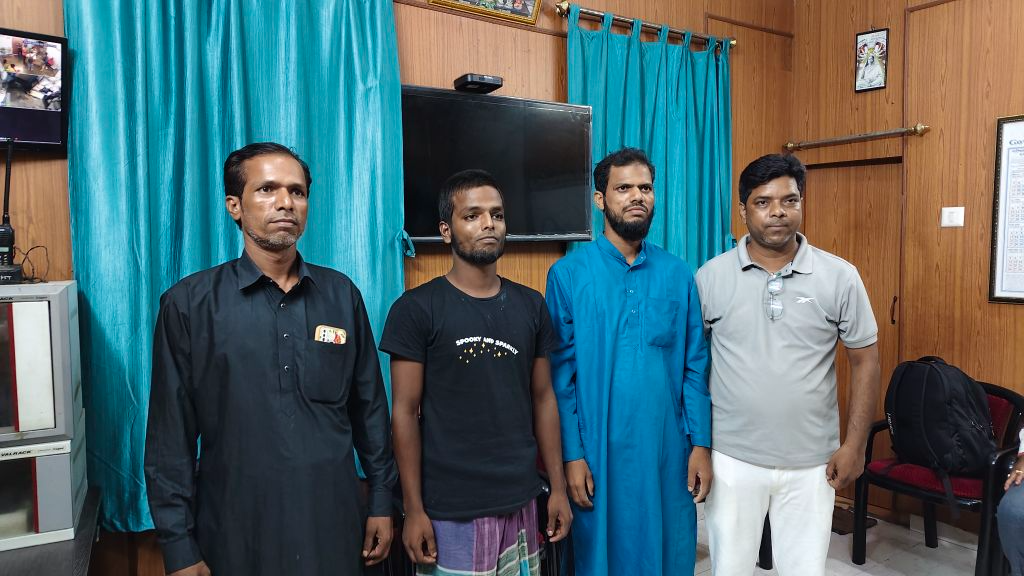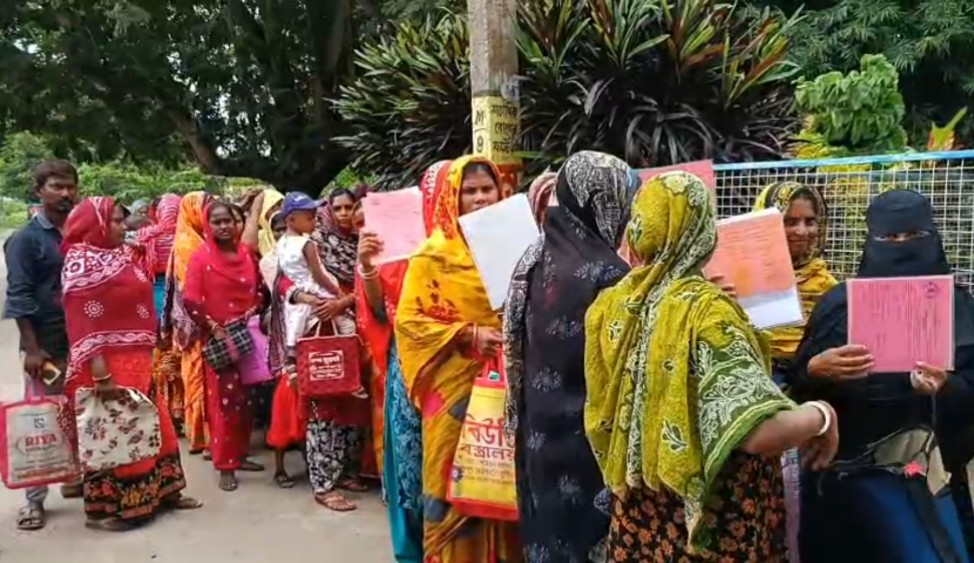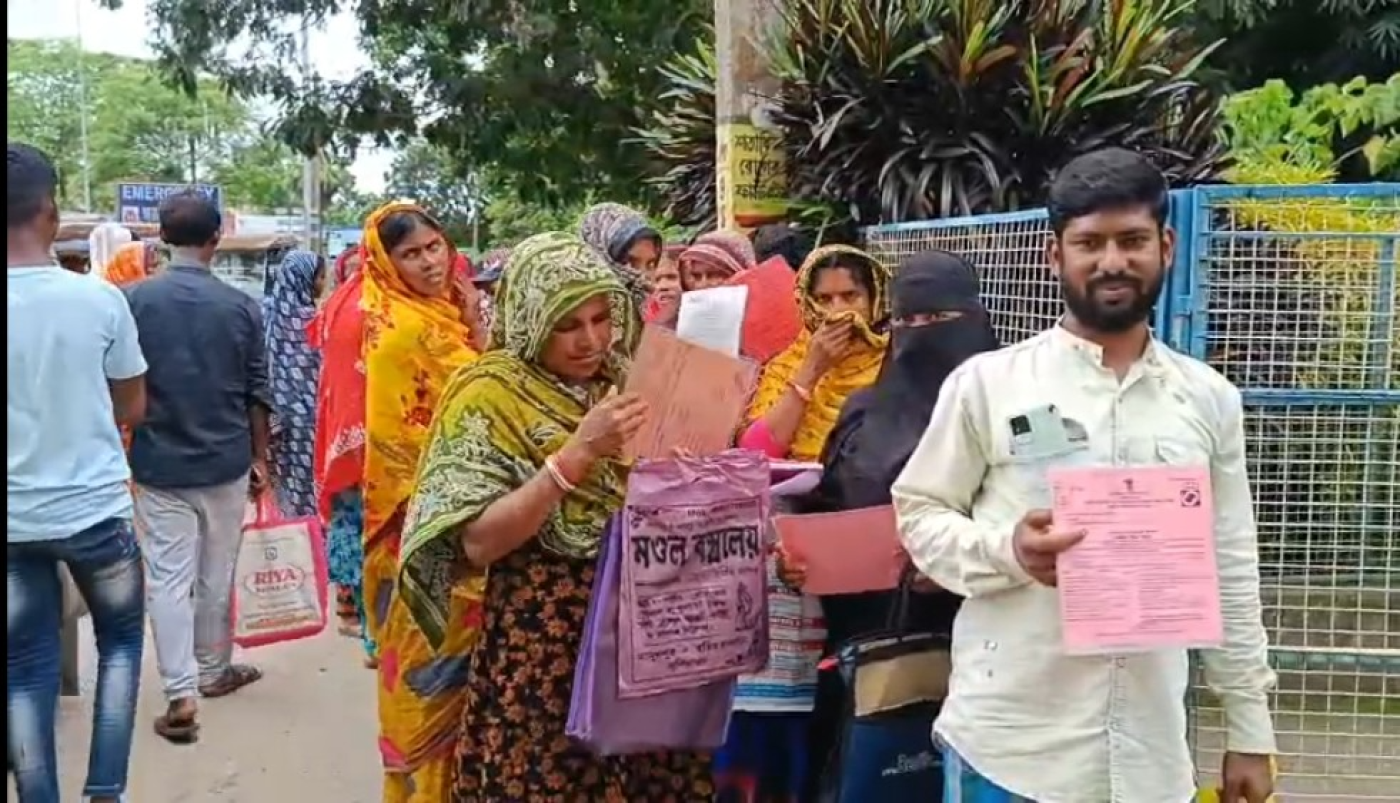Kolkata: Md. Safiullah Ansari, 28, had to tackle several errors in his paperwork: his last name is spelled “Ansary” on his voter ID but “Ansari” on his Aadhaar, and his 10th- and 12th-standard exam admission cards do not have the “Md.” prefix.
To resolve these errors, he had to refer to his dead father’s voter identification, but that was easier said than done.
“We could not find my father’s voter ID card anywhere at home,” said Ansari, one of thousands of Bengalis lined up outside a government office frantically trying to prove they were voters and, by implication, Indian.
“Who knew, a dead person’s voter ID card would become so important one day?” said Ansari.
On 28 August 2025, with no announcement, the Election Commission of India (ECI) uploaded West Bengal’s 2002 voter list on its website, indicating that the state’s voter rolls would be revised after 23 years, ahead of state elections in 2026.
The quiet move sparked fears that the revision would be as chaotic as in Bihar, where 6.5 million were excluded during what was officially called a special intensive revision (SIR) of the rolls.
Just over a month later, the ECI indicated that voter rolls would be revised nationwide.
The revision of rolls in West Bengal has not begun, but the anxiety is evident, especially in eight districts bordering Bangladesh and especially among Muslims, after repeated rhetoric from the Prime Minister and the home minister (here and here) about removal of “infiltrators” from the rolls.
The Chronology
As Article 14 reported in July 2025, there is strong evidence that the revision of voter rolls will morph into a trial of citizenship.
“Aap chronology samjhiye,” home minister Amit Shah said in West Bengal in 2019. Understand the chronology. First, in 2019, came a new citizenship law, the Citizenship (Amendment) Act that excluded Muslims. Second, Shah has referred to a National Register of Citizens (NRC) to purge “infiltrators”.
The NRC has only been in operation in Assam, and the fear that is spreading across West Bengal now, said locals, that the revision of voter lists will be the de facto NRC, which is why thousands are now scrambling to dig out old documents, get new papers to make corrections.
An arts graduate and shopkeeper in the village of Chachanda in Murshidabad district, Ansari must now correct discrepancies and secure both his father’s death certificate and his own birth certificate—neither of which his family ever collected.
Only his state education certificates, more widely accepted as proof, spare him from immediate crisis.
Others face steeper hurdles.
The Rush For Papers
The rush for paperwork dominates panchayat offices, hospitals, courts, and block development offices (BDOs) across districts like Uttar Dinajpur, Cooch Behar, Murshidabad, Malda, Nadia, Birbhum, North 24-Parganas and South 24-Parganas. Of these, Murshidabad, Malda and Uttar Dinajpur are West Bengal’s three Muslim-majority districts.
“Since mid-July, there has been a huge spike in people coming for affidavits,” said Sudhangshu Sekhar Dutta, a Malda court lawyer and notary public, who estimated a five- to six-fold increase.
Missing names in the 2002 Bengal voter list drive many to chase birth certificates; discrepancies in spelling, date, or address often mean affidavits (sometimes requiring costly ads in Bengali and English papers) must be submitted.
An application can require Aadhaar, voter ID, school or land certificates, parents’ IDs, and—if discrepancies surface—much more legwork.
Forty-year-old Nazrul Mandal, a resident of Dhubulia in Nadia district, has his name as Nazrul Mandal, Nazrul Sekh and Nazrul Sk on different identity documents. He has had to advertise in two newspapers an affidavit sworn before a magistrate in another town, declaring that the three are “same and one identical person”.
Similarly, his father's name appears as Islam Mandal in the 2002 voter list, but Islam Sekh and Islam Sk on other documents. He will now be known as Nazrul Mandal, and his father, Islam Mandal, the affidavit said.
For Aishmina Khatun, 21, of Nakashipara in Nadia district, her name appears as Aishmina Khatun and Aishomina Khatun on different documents. She blamed government-appointed data entry operators, but she had to publish advertisements declaring that the two names were hers and that she would now be known as Aishmina Khatun.
Those like Kursia Khatun face different names on school registration, voter ID and Aadhaar; others like Saibul Sk, who was detained for a week in Gujarat, confronted mismatched birth dates between EPIC and Aadhaar.
Even a missing father’s name, phone number or address on an Aadhaar can render it “nearly useless,” residents fear.
The Cost Of Correction
For 43-year-old Abdul Sattar, the struggle is harder. He has never been to school. A resident of Kumarjol village in Bahin gram panchayat of Raiganj block on the Bangladesh border in Uttar Dinajpur, he holds four identity documents—Aadhaar, voter ID, ration card and PAN.
In early September, a local teacher kindly checked his documents and found a spelling error in his father’s name on Aadhaar: Ajijul Mohammad had become Ajijur Mohammad. Sattar had the mistake corrected, but it cost him about Rs 300—Rs 100 for travel to the Raiganj block office and the rest for food and processing fees. He also lost a day’s wages.
He was advised to collect his birth certificate as well, but feels hopeless. “I went to the block office to enquire, but the process required a lot of legwork and paperwork, for which I don’t have the time,” he told Article 14.
Sattar earns around Rs 800 a day as a construction labourer in Maharashtra. In Bengal, where he returns during the monsoon, agricultural work pays no more than Rs 400. “I have to return to Mumbai as soon as the Durga Puja–Dussehra festive season is over,” he said.
People like him want the state government or panchayat administration to set up camps in villages to receive applications for document collection and correction.
“If even a weekly or fortnightly camp is organised in villages, people will be saved a great deal of harassment,” said Sattar.
The NRC & New Fears
The scramble for paperwork echoes what happened in Assam in 2019–2020, when families learned via the media that spelling mistakes and mismatches could erase citizenship rights, as happened with 1.9 million excluded from that state’s NRC.
Assam’s NRC is a citizenship screening exercise carried out following decades of protests and violence seeking expulsion of illegal Bangladeshi immigrants settled in Assam.
For inclusion in the NRC list, residents had to prove that they or their ancestors had entered Assam before midnight on 24 March 1971.
But the process was often faulty and arbitrary. Many of those excluded from the list published in 2019 faced months of detention until managing to prove bona fide Indian citizenship.
Worries in West Bengal eased after 2021 state elections, but have returned with greater force since June 2025.
The Illegal Deportations
BJP-ruled states are now detaining, harassing, or deporting Bengali-speaking Muslim workers as “illegal migrants”—in some cases forcibly sending them to Bangladesh, as Article 14 has reported.
Viral videos, such as this plea from Amir Sk, have brought some home, but their ordeal highlighted the vulnerability caused by minor paperwork discrepancies.

After returning to India in August, Amir Sk told this reporter over the phone that police in Rajasthan refused to accept his birth certificate on two grounds: it was an old, hand-written document rather than the digitised version now issued, and his father’s name appeared differently—Ziam Sk in the birth certificate, but Jiyem Sekh on his Aadhaar.
Handwritten certificates, once commonplace, are no longer considered valid for Aadhaar updates or in police checks outside Bengal.
As a result, requests to schools, health departments, and the West Bengal Board of Secondary Education for updated paperwork and corrections have soared.
Mirza Samiul Islam, a lawyer at the Domkal sub-divisional court, said most people still possess such manually issued birth certificates, but digitally generated ones have now become mandatory for obtaining or correcting Aadhaar cards.
Several migrant workers recently detained in different states as suspected Bangladeshi nationals later told neighbours and local journalists that police there, too, refused to recognise hand-written birth certificates as valid.
The High Stakes of Minor Errors
While West Bengal’s revision of voter rolls has not begun, as we said, government instructions to cross-check voter rolls from 2002 and 2025 have spread unrest.
Essential IDs—Aadhaar, ration card, PAN, voter ID—are common, but often the ECI has accepted only certain documents, leaving many uneasy.
“Spelling mismatches in different documents are quite common, government officials usually ignore minor mismatches,” said a state labour welfare official, speaking on condition of anonymity since he was not authorised to speak to the media. “However, people do not expect the ECI to be considerate about such mismatches.”
Of 11 document types previously accepted by the ECI for Bihar’s voter roll, many—such as old passports, permanent residence certificates, or forest rights records—are rare in Bengal’s border belt.
OBC certificates for Muslims are also at risk, with court rulings striking down parts of the state’s OBC list, a move mostly affecting various Muslim communities.
The Anxiety Over Aadhaar
The Supreme Court’s 8 September order, directing the ECI to view Aadhaar as valid voter proof in Bihar, should have eased worries. The ECI has since ordered its authorities to accept Aadhaar among 12 documents for identity.
Yet, as of September, many in Murshidabad, Malda, Cooch Behar, Uttar Dinajpur and the 24-Parganas, especially Muslims, remain on edge.
A member of the legislative assembly (MLA) of West Bengal, speaking on condition of anonymity because of the sensitivity of the topic, said he was advising constituents to keep three mutually corroborating documents.
“The authorities can still question Aadhaar’s authenticity or seek further proof,” said the MLA. “And there’s no guarantee the ruling will apply to SIR in Bengal.”
For Bengali-speaking Muslim migrants, Aadhaar has failed to assure police in several BJP-ruled states since April, with officers refusing to accept it as proof of citizenship.

“The rush for correcting and collecting documents is not only for the SIR, it’s also because people migrate for work and they need to satisfy local police in those states,” said Asif Faruk of Parijayee Shramik Aikya Mancha (migrant workers’ united forum), a volunteer organisation.
“In many cases, it seems the errors happened at the administration’s end at the time of entering the data,” said Hamid Mollah, whom many approached for help because he is a schoolteacher hopeful with an MA and a B.Ed degree. “Many people are suffering due to data entry errors.”
The Uncertainty
Nayoni Adhikari Barman, a panchayat member in Uttar Dinajpur district, said mismatches in official documents were common—“in almost every second household, Bimal Adhikari became Bimala, Nirmal became Nimai, someone’s last name got dropped, and so on.”
She added that anxieties among Hindus had eased somewhat after the union ministry of home affairs extended the cut-off date under the Citizenship Amendment Act, from 31 December 2014 to 31 December 2024.
The law offers citizenship to non-Muslim migrants from India’s Muslim-majority neighbours.
“While this means non-Muslims, mainly Hindus, cannot be deported even if they fail to prove citizenship, there is still confusion over whether the CAA extension ensures their names will not be struck off the electoral rolls if they cannot prove voter eligibility,” Barman said.
Errors—big and small—are common in nearly every household, she noted.
With stricter scrutiny and the everyday risk of deportation or disenfranchisement, Muslim families and other affected communities now treat each document, certificate, and data point as a line of defence against statelessness.
(Snigdhendu Bhattacharya is a Kolkata-based author and independent journalist.)
Get exclusive access to new databases, expert analyses, weekly newsletters, book excerpts and new ideas on democracy, law and society in India. Subscribe to Article 14.

